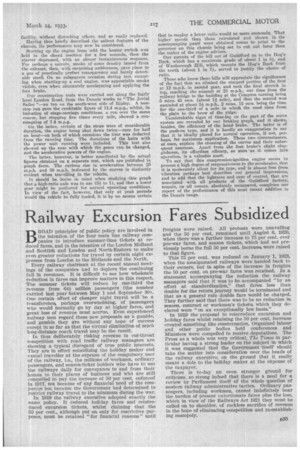Railway Excursion Fares Subsidized
Page 49

If you've noticed an error in this article please click here to report it so we can fix it.
BROAD principles of public policy are involved in the intention of the four main line railway companies to introduce summer-time tickets at reduced fares, and in the intention of the London Midland and Scottish and London and North-Eastern to make even greater reductions for travel by certain night expresses from London to the Midlands and the North.
Every railway chairman at the recent annual meetings of the companies had to depjore the continuing fall In revenues. It is diffieult to see how wholesale reduction in fares can improve matters in this respect. The summer tickets will reduce by one-third the revenue from 64i millidn passengers (the number carried last year between May 1 and September 30). One certain effect of cheaper night travel will be a transferencek perhaps overwhelming, of passengers who would normally go by day at higher fares, and great loss of revenue must accrue. Even experienced railway men regard these new proposals as a gamble, and gamble they are without any hope of success except in so far as that the virtual elimination of much long-distance coach travel may be the result.
In thus deliberately risking revenue in cut-throat competition with road traffic railway managers are showing a typical disregard of true public interests. They are in effect subsidizing the holiday maker and casual traveller at the expense of the compulsory user of the railway, i.e., the millions of workmen, ordinary passengers, and season-ticket holders who have to use the railways daily for conveyance to and from their homes to their places of business and who are still compelled to pay the increase of 50 per cent. enforced in 1917, not because of any financial need of the companies but because the Government had determined to restrict railway travel to the minimum during the war.
In 1919 the railway executive adopted exactly the same policy. It reduced holiday fares and reintroduced excursion tickets, whilst claiming that the 50 per cent., although put on only for restrictive purposes, must be retained "for financial reasons" until freights were raised. .All protests were unavailing and the 50 per cent, remained until August 6, 1920, when there was a further increase to 75 per cent. over pre-war fares, and season tickets, which had not previously borne the full 50 per cent. increase, were raised to that figure.
This 75 per cent. was reduced on January 1, 1923, when the amalgamated railways were handed back to their owners, but in spite of the increase in freights the 50 per cent. on pre-war fares was retained. In a statement accompanying the reduction the railway managers said that it was to be accompanied "by an effort at standardization," that fares less than double for the return journey would be terminated anti that as a general rule double fare would be charged. They further said that there was to be no reduction in season, contract or workmen's tickets, which they declared were "on an exceptionally low basis."
In 1919 the proposal to reintroduce excursion and holiday fares whilst retaining the 50 per cent. increase created something like consternation. Organized labour and other public bodies held conferences and Ministers were compelled to receive Aeputations. The Press as a whole was very critical, The Times in particular having a strong leader on the subject in which it was suggested that the Government itself should take the matter into consideration over the heads of the railway executive, on the ground that it really meant a dole to the holiday maker at the expense or the taxpayer.
There is to-day an even stronger ground for criticism, so strong indeed that there is a need for a review by Parliament itself of the whole question of modern railway administrative tactics. Ordinary passengers, including workmen, cannot indefinitely bear the burden of present extortionate fares plus the loss, which in view of the Railways Act 1921 they must be called on to shoulder, of reckless sacrifice of revenue in the hope of eliminating competition and re-establishing monopoly.




























































































